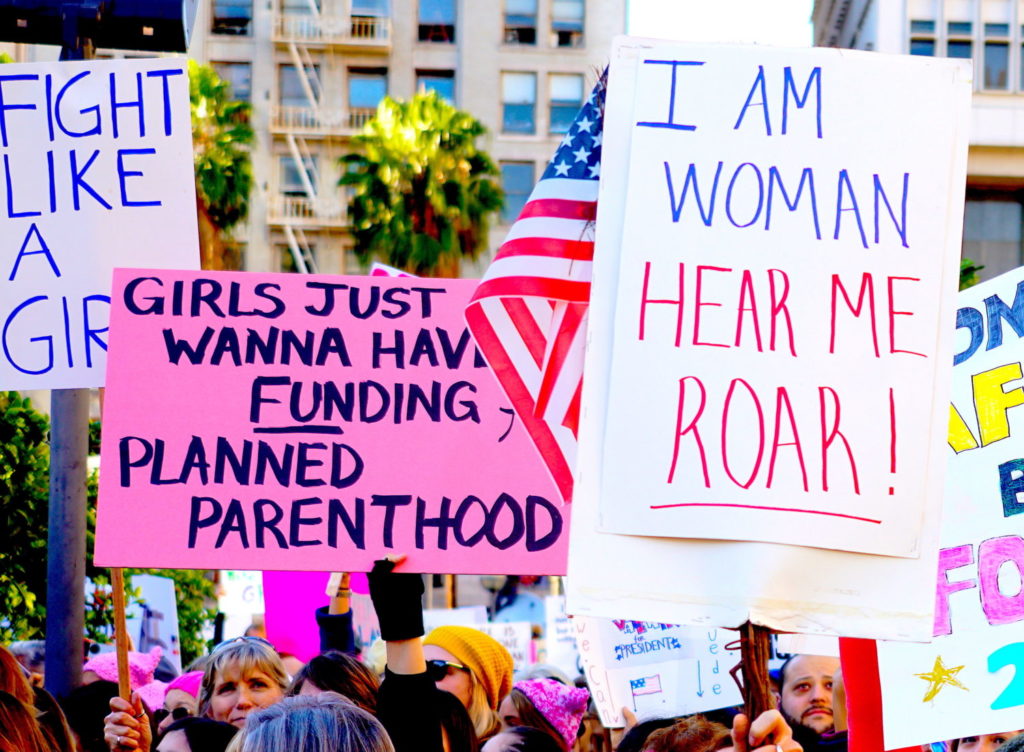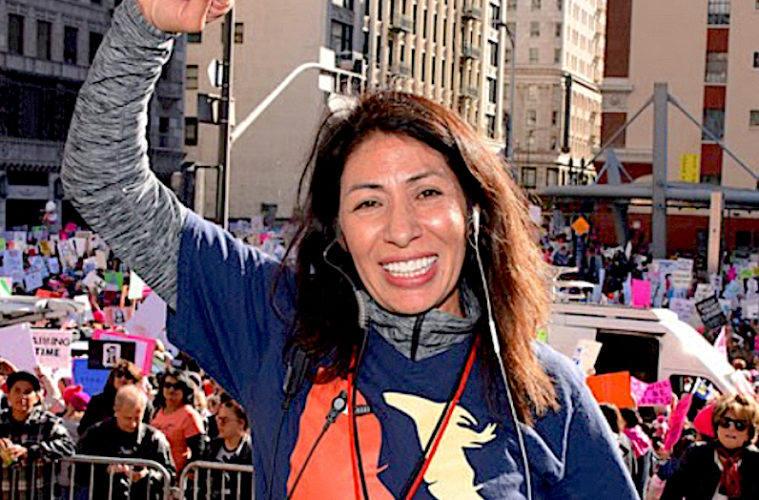Earlier this month, one of the largest digital voter events on record – in alignment with a special Women’s March on Washington in the streets to protest against the hasty filling of Ruth Bader Ginsburg’s Supreme Court seat – took place. It was just one of many mobilization events moved online in the wake of the coronavirus. While the impact that these kinds of drives will have on the election remains to be seen, they serve an important function regardless – bringing women of all colors and backgrounds together in opposition to the current administration and its discriminatory policies. Under the banner hashtag #CountOnUs, Women’s March and the offshoot Women’s March Action group have mobilized thousands of volunteers to send well over 3.5 million texts across the country to registered women voters.
After helping organize the L.A. Women’s March in 2016 in the wake of Trump’s election, Emiliana Guereca (who goes by “Emi”) felt a responsibility to continue the fight, so she spearheaded the online efforts by founding Women’s March Action. A first generation Latina immigrant, born in Chicago and based in Los Angeles, Guereca was the first person in her family to vote and go to college, going on to become a successful businesswoman while seeking to help marginalized communities.
Taking to phones and computers, her Action group’s volunteers are seeking to reach women in key battleground states, helping them make early voting plans, educating them on the rules, and deadlines. We spoke with Guereca about her motivations, experiences and vision for bringing women together to make their voices heard during what is clearly one of the most contentious elections in U.S. history.
L.A. WEEKLY: Beyond the obvious, why is the women’s vote so important, and what does our participation, or lack thereof, say about our cultural perspective and priorities?
EMILIANA GUERECA: The history of women voting is really the history of our democracy, it’s the story of people who were excluded for generations fighting back and building power to have our say. Many marginalized communities have had to fight for their right to vote, and continue to fight today as voter suppression still keeps millions of people from making their voices heard, because of their race or class. As we celebrate the 100th anniversary of the 19th Amendment, it’s only fitting that women are on course to make up the biggest voting block in the 2020 elections. Despite being excluded for so long, women have actually voted at higher rates in every presidential election since 1964, according to data from the U.S. Census. Women will decide the next president – which means women’s issues are at the forefront of this election.

(Courtesy Women’s March Action)
Women’s March was an amazing event that really made a statement about our power to mobilize, but many took issue with some of the ways it evolved over the years, in terms of women of color (and non-binary people as well) not being heard, or not being involved as overtly as white cis gender women. Add to this, the feeling that white female votes helped Trump win, and the division that’s been sowed isn’t surprising. As a Latina who was part of the movement early on, what are your thoughts on this and how can we address the problem?
That narrative of division is really not my experience as a Latina immigrant organizer in the Women’s March movement. I work with women from all communities and we’re building a multiracial and multigenerational movement. The original Women’s March after Trump’s election was the largest single-day protest in U.S. history, and each year the Women’s March has become more diverse and reflected the leadership and vision of more women of color. Together we are working to elect leaders who will fight for the rights of all women. With that said, organizing is not easy – however, we will continue to organize because if we are not at the table or in the room where decisions are made then we are on the menu.
Voter suppression and misinformation have been rampant. How do you restore faith in the system, and educate the public here in L.A. and across the country?
We focus on empowering voters to cast their ballot no matter what voter suppression tactics are thrown against us, because exercising our rights to vote is the only way we can protect it. Our voter contact volunteers have been texting millions of voters in swing states to help them make a plan to vote early. They’re equipped with the rules and deadlines in each state, resources to find polling places and drop-off locations, and tips to help voters avoid common mistakes that can prevent them from voting.
Women’s March Action has a goal of reaching 10 million voters. Tell me about the group’s plans to mobilize voters and the challenges due to Covid-19.
Covid-19 has made traditional voter contact more dangerous, and we all have so much more on our minds as we struggle to care for our families amid so much uncertainty. We’ve had to pivot our mobilization efforts to focus on digital engagement, primarily texting – it’s an every-tool-in-the-shed approach so we have done phone banks and postcard campaigns, but we’ve found that texting is accessible to the most volunteers and has the widest reach. We’ve also had to pivot in terms of how we care for our community and each other. So we’ve held Zoom happy hours, community care events, and keep a Slack channel for volunteers to connect in their off hours. Those kinds of digital community spaces have become vital ways to fight against the isolation of quarantine and keep building community.
We knew Trump was a threat back in 2016 and we marched to say so. … Four years later our worst fears have come to fruition. What are your fears if he is re-elected and what is the plan in terms of actions if he is?
The nightmare of the Trump administration is this country’s daily reality, and has been for four years. From children and families separated within cages, to forced sterilization without informed consent, to the Covid-19 pandemic sweeping through the country – and then dishonesty spewed through every news source – it is self-evident that our fears are a reality. We filed an official protest with the UN for Crimes Against Humanity when that was revealed. Once we open our eyes to crimes against humanity being committed against women on our soil, we don’t need to imagine what might come next, it’s already here. We will fight against the crimes of Trump and his administration any and every way we can, as long as they stay in power. If Trump is re-elected, expect the country to take to the streets, on a daily basis in November. We don’t believe he will be re-elected, as such, we are scheduled for a January 23rd March, across the globe.
Women’s March Action has daily online events happening now thru Nov. 1st. Get involved at: mobilize.us/womensmarchaction/
Advertising disclosure: We may receive compensation for some of the links in our stories. Thank you for supporting LA Weekly and our advertisers.

